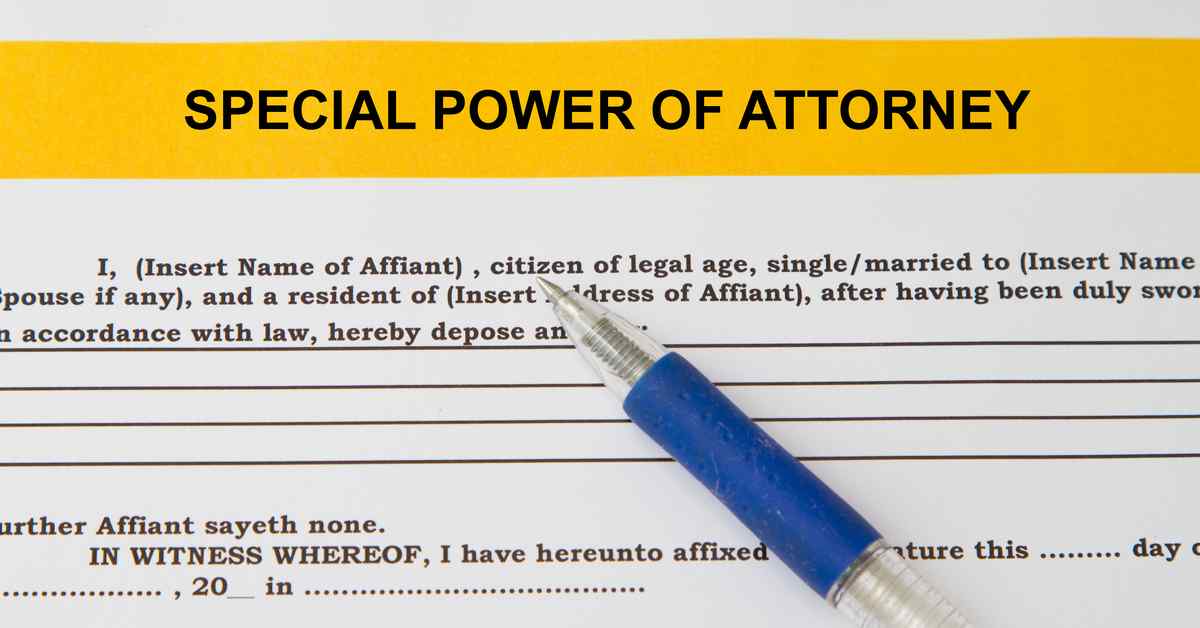Table of Contents
Quality Service Guarantee Or Painting Free

Get a rental agreement with doorstep delivery

Find the BEST deals and get unbelievable DISCOUNTS directly from builders!

5-Star rated painters, premium paints and services at the BEST PRICES!
Loved what you read? Share it with others!

Irrevocable Power of Attorney: Legal Guide for Property Owners in 2025
Table of Contents
An irrevocable power of attorney represents a significant legal commitment that requires careful consideration and understanding. This guide explains how a legal document permanently gives an agent the power to make decisions on behalf of someone else. Unlike revocable powers of attorney, once established, these rights cannot be withdrawn or modified without the agent's consent. Whether used for estate planning, business transactions, or property management, an irrevocable POA carries substantial legal implications and responsibilities. Knowing the types, drafting procedures, and risks is vital for anyone considering this legal arrangement that can significantly affect their finances and legal affairs.
Understanding Irrevocable Power of Attorney in 2025
An irrevocable power of attorney is a legal document that permanently transfers specific decision-making rights from a principal to an agent or attorney-in-fact. Unlike other forms of power of attorney, these rights cannot be withdrawn or modified without the agent's consent. This important legal tool is often utilized in estate planning, business transactions, and property management to help maintain continuity and security in making decisions.
Distinction from Revocable POA
Understanding revocable vs. irrevocable general power of attorney is crucial for informed legal decisions. Both types grant authority to an agent, but their implications and permanence vary, affecting their usage and long-term consequences.
Quality Service Guarantee Or Painting Free

Get a rental agreement with doorstep delivery

Find the BEST deals and get unbelievable DISCOUNTS directly from builders!

5-Star rated painters, premium paints and services at the BEST PRICES!
| Feature | Revocable POA | Irrevocable POA |
| Modification Rights | Can be modified at any time by principal | Requires agent's consent for any changes |
| Termination | Principal can revoke at will | Cannot be revoked unilaterally |
| Control | Principal retains ultimate control | Principal surrenders specified control permanently |
| Flexibility | Highly flexible and adaptable | Fixed and permanent once established |
| Common Uses | Temporary arrangements, healthcare decisions | Estate planning, business contracts |
| Duration | Can be temporary or ongoing | Typically permanent |
Types of Irrevocable Power of Attorney
An irrevocable power of attorney form can be of various types, each designed to serve specific legal and financial purposes. Understanding these different types helps in selecting the most appropriate arrangement for your particular situation and requirements.
- General Irrevocable POA: Grants comprehensive authority over financial and legal matters, allowing the agent to manage all aspects of the principal's affairs within specified domains.
- Limited Irrevocable POA: Restricts the agent's authority to specific transactions, properties, or time periods, providing focused control for particular purposes.
- Financial Irrevocable POA: Specifically covers financial decisions and transactions, including banking, investments, and property management.
- Property-Specific POA: Focuses exclusively on real estate matters, allowing the agent to manage, sell, or transfer specified properties.
- Business Irrevocable POA: Designed for business operations, enabling the agent to make corporate decisions and execute business transactions.
Legal Implications of POA
An irrevocable power of attorney carries significant legal consequences that affect both the principal and the agent. Understanding these implications is crucial before establishing this binding arrangement, as it creates permanent obligations and responsibilities that cannot be easily modified or terminated.
- Fiduciary Responsibility: The agent assumes a legal duty to act in the principal's best interests, making decisions that prioritize the principal's welfare over personal gain.
- Permanent Transfer of Authority: Once established, the principal permanently surrenders specified decision-making rights, which cannot be reclaimed without the agent's agreement.
- Third-Party Recognition: Financial institutions and other entities must legally recognize and honour the agent's authority within the scope defined in the document.
- Liability Protection: The principal may be bound by the agent's actions, even if they disagree, as long as the agent acts within their authorized scope.
- Estate Planning Impact: The arrangement can affect estate distribution and tax implications, potentially bypassing probate for certain assets under the POA.
Drafting an Irrevocable Power of Attorney
Creating an irrevocable power of attorney requires careful attention to detail and proper legal procedures to ensure its validity and effectiveness. The document must clearly outline the scope of authority, responsibilities, and limitations while meeting all state-specific legal requirements.
- Consult Legal Professionals: Meet with an experienced attorney to understand legal requirements and implications specific to your jurisdiction and circumstances.
- Define Scope and Powers: Clearly specify which powers are being granted, including any limitations or restrictions on the agent's authority.
- Select Qualified Agent: Choose a trustworthy individual or institution capable of handling the responsibilities and understanding fiduciary obligations.
- Document Preparation: Draft the document with precise language that clearly outlines all terms, conditions, and powers being granted.
- Review and Verification: Have all parties review the document thoroughly to ensure understanding and agreement with all terms.
- Legal Execution: Follow state-specific requirements for signatures, witnesses, and notarization to ensure legal validity.
- Distribution and Recording: Provide copies to relevant parties and record the document with appropriate authorities if required.
Risks and Considerations of Irrevocable POA
Establishing an irrevocable power of attorney involves significant risks that require careful evaluation before proceeding. The permanent nature of this arrangement means that any mistakes or oversights can have lasting consequences. The principal must consider the potential for changed circumstances, the agent's reliability over time, and the impact on family relationships. Additionally, the lack of flexibility in modifying the arrangement can create challenges if the agent's performance becomes unsatisfactory or if new situations arise that weren't contemplated in the original agreement.
In Summary of Irrevocable Power of Attorney
An irrevocable power of attorney stands as a powerful but complex legal tool that demands thorough understanding and careful implementation. Its permanent nature makes it both a valuable tool for long-term planning and a significant responsibility that requires careful consideration. Success with an irrevocable POA depends largely on proper agent selection, clear documentation, and a comprehensive understanding of all legal implications. While it offers robust protection for estate planning and business arrangements, its irrevocable nature means that mistakes can have lasting consequences. If you're thinking about this option, it's really important to team up with skilled legal professionals and take a close look at every part of the arrangement. This way, you can make sure it meets its goals and keeps everyone's best interests safe!
Frequently Asked Questions
Ans: A revocable power of attorney can be modified or terminated by the principal at any time, while an irrevocable power of attorney cannot be changed without the agent's consent. This fundamental difference makes irrevocable POAs more permanent and binding, typically used for specific legal or financial planning purposes.
Ans: An irrevocable power of attorney cannot be unilaterally revoked by the principal. However, irrevocable power of attorney can be revoked if both the principal and agent agree to the termination or if a court finds substantial misconduct or breach of fiduciary duty by the agent.
Ans: Generally, an irrevocable power of attorney terminates upon the principal's death. However, specific provisions and state laws may affect this. Any actions taken by the agent after the principal's death could be legally challenged, making it essential to understand local regulations.
Ans: The primary risks include potential abuse of power by the agent, inability to modify the arrangement as circumstances change, and complications in legal relationships with third parties. The permanent nature of the agreement means that mistakes in agent selection or power designation can have lasting consequences.
Ans: To ensure safe use, carefully select a trustworthy agent, clearly define the scope of powers, consult with legal professionals during drafting, include specific limitations and oversight mechanisms, and maintain open communication with all involved parties throughout the arrangement.
Recommended Reading

Legal Documents You Need To Buy And Sell Property: Essential Guide
January 15, 2025
25181+ views

A Complete Guide to GPA for Property - Is it Safe to Buy? GPA for Property Rules in India
January 15, 2025
21571+ views

Special Power of Attorney in India: Costs, Stamp Duty & Legal Requirements in 2025
May 1, 2025
20773+ views

Trust Deeds in India: A Complete Guide
November 30, 2023
11193+ views

Power of Attorney: Meaning, Types and Important Clauses
January 15, 2025
10949+ views
Loved what you read? Share it with others!
Most Viewed Articles

Franking Charges Explained: Meaning and Benefits
January 31, 2025
1115381+ views

Society Maintenance Charges : Meaning, Cost, Types and Calculation
January 31, 2025
193299+ views

BBMP E-Khata Registration process for property owners in Bangalore, Karnataka in 2025
March 19, 2025
145603+ views

Daughter's Right in Fathers' Property - the Law is Finally Equal for both Genders?
June 1, 2025
132794+ views

Rectification Deed Format and Process in India 2025
June 1, 2025
127997+ views
Recent blogs in
How To Register a Rent Agreement Online In Gujarat: Process, Documents and Fees in 2026
January 19, 2026 by Ananth
What is Registered Lease Agreement: Meaning, Legal Validity, Benefits and Online Registration
January 19, 2026 by Krishnanunni H M
What Is a Room Rental Agreement: Meaning, Purpose and Importance in 2026
January 12, 2026 by Kruthi









 Full RM + FRM support
Full RM + FRM support
Join the conversation!